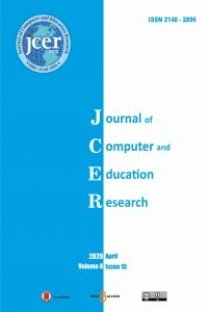Bilgi ve İletişim Teknolojilerinin Kullanımı ve Etik Olmayan Davranışlar: Sorunlar, Araştırmalar ve Değerlendirmeler
Bu çalışmanın amacı bilgi ve iletişim teknolojilerinin (BİT) kullanımında etik olmayan davranışları konu alan araştırma çalışmalarını inceleyerek çeşitli değerlendirmeler yapmaktır. Bu değerlendirmeler alanyazındaki etik konusuyla ilgili araştırmalar analiz edilerek yapılmıştır. Araştırma kapsamında ulaşılan “Bilgi ve İletişim Teknolojilerinin Kullanımında Etik Olmayan Davranışlar” konusuyla ilgili çalışmalar yurt dışında yapılan araştırmalar ve yurt içinde yapılan araştırmalar şeklinde ele alınmıştır. BİT’in etik kullanımı ile ilgili yurt dışında yapılan çalışmalarda ulaşılan sonuçlar incelendiğinde; bilgi ve iletişim teknolojileri alanında etik davranış ve bilinç geliştirme açısından bireylerin ikilemler yaşadıkları tespit edilmiştir. Bununla birlikte BİT’in etik ve yasal kullanımında sosyal normlar, cinsiyet, yaş, kişisel değerler, ahlaki yargı, toplumsal değerler, ahlaki sorumluluk gibi özelliklerin etkili olduğu görülmüştür. BİT’in etik kullanımı ile ilgili Türkiye’de yapılan çalışmalarda ulaşılan sonuçlar incelendiğinde ise; bireylerin bilgi ve iletişim teknolojilerinin etik kullanımına ilişkin görüş ve davranışlarının cinsiyet ile ebeveyn eğitim durumu gibi demografik özelliklere göre farklılaştığı görülmüştür.
Anahtar Kelimeler:
Bilgi ve iletişim teknolojileri, etik, etik olmayan davranışlar, teknoloji
Issues in the Use of Information and Communication Technologies and Unethical Behaviors: An Overview
The purpose of this study is to examine literature on unethical behavior in the use of information and communication technologies (ICT). In reaching this goal a search was conducted. When presenting the results findings of research conducted in abroad and in Turkey are presented respectively in order from the oldest to date. Findings indicated that ICT users have some dilemmas about identified ethical behavior and awareness in ethical behavior. In addition, social norms, gender, age, personal values, moral judgment, social values, moral responsibility has been effective in the ethical and legal use of ICT. On the other hand, it was confirmed that individuals’ opinions about unethical behavior in the use of ICT change according to demographic characteristics like gender, and parents’ education level in researches conducted in Turkey.
___
- Adam, A., & Ofori-Amanfo, J. (2000). Does gender matter in computer ethics? Ethics and Information Technology, 2, 37-47.
- Akbulut, Y., Uysal, Ö., Odabasi, H. F., & Kuzu, A. (2008). Influence of gender, program of study and PC experience on unethical computer using behaviors of Turkish undergraduate students. Computers & Education, 51, 485-492.
- Aksal, F. A. (2011). Bilgisayar teknolojilerinin kullanımında etik ve karşılaşılan sorunlar. Eğitim Teknolojileri Araştırmaları Dergisi, 2(3).
- Beycioğlu, K. (2009) .A cyberphilosophical issue in education: Unethical computer using behavior - The case of prospective teachers. Computers & Education, 53(2), 201-208.
- Cohen, L., Manion, L., & Morrison, K. (2007). Research methods in education (6th ed.). New York, NY:Routledge.
- Dill, B. J., & Anderson, R. E. (2003). Ethics-related technology policies in schools. Social Science Computer Review, 21(3), 326-339.
- Dorantes, C. A., Hewitt, B., & Goles, T. (2006). Ethical decision-making in an IT context: the roles of personal moral philosophies and moral intensity. Proceedings of the 39th Hawaii International Conference on System Sciences. Hawaii, USA.
- Drevin, L. (2008). Ethical perspectives in the cyber world – a comparison of views of it professionals and students. Combined Proceedings of the 13th and 14th Annual CPTS Working Conference, Maarssden, The Netherlands.
- Fraenkel, J. R., & Wallen, N. E. (2006). How to design and evaluate research in education (6th ed.). New York: McGraw-Hill Book Company.
- Hur, J. H., Kim, K. Y., Song, J.-B., & Lee, T. W. (2009). The narrative approach to teach information and communication ethics education in elementary school. Proceedings of the 17th International Conference on Computers in Education – ICCE. Asia-Pacific Society for Computers in Education, Hong Kong.
- Yayın Aralığı: Yılda 2 Sayı
- Başlangıç: 2013
- Yayıncı: Tamer KUTLUCA
Sayıdaki Diğer Makaleler
Eleştirel Düşünme ve Empatik Eğilim İlişkisi: Beden Eğitimi Öğretmeni Adayları Örneği
Ezel Nur KORUR, Erman ÖNCÜ, Sonnur KÜÇÜK KILIÇ
Sosyal Bilgiler Dersinde İşbirlikli Öğrenme Yöntemlerinin Akademik Başarı Üzerindeki Etkisi
Hatice DURAK, Mustafa SARITEPECİ, Hasan ÇAKIR
